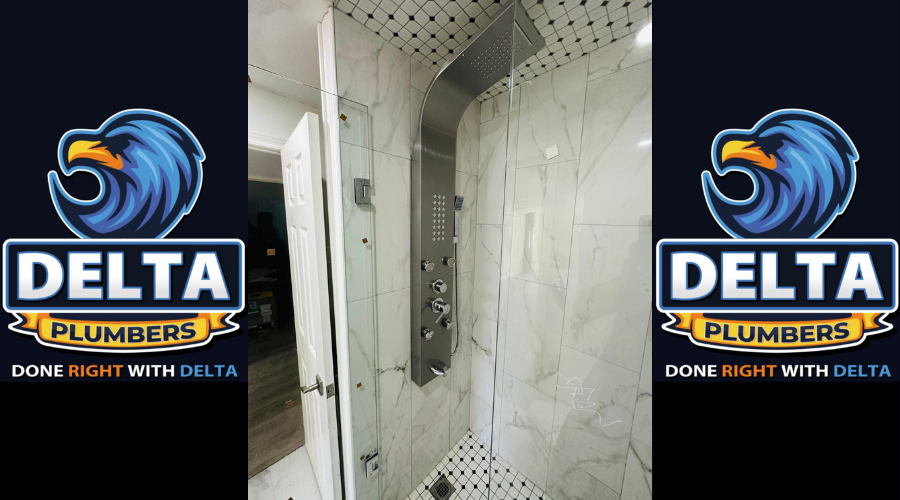Shower leaks can be both frustrating and damaging if left untreated. The constant drip of water is not only a nuisance but can lead to water damage, mold growth, and increased utility bills. At Delta Plumbers, we understand the urgency of fixing leaks quickly and efficiently. In this complete guide, we’ll walk you through everything you need to know about How to Repair a Leaking Shower, from identifying the source of the leak to determining if you can fix it without removing tiles.

Picture Source – Delta Plumbers
Can a Leaking Shower Be Repaired?
Yes, a leaking shower can be repaired, and it’s essential to address the issue as soon as possible to avoid further complications. Leaks can come from various sources, such as the showerhead, faucet, grout, or even behind the walls. The key to successfully repairing a leaking shower is identifying the root cause of the leak.
When you first notice a shower leak, it’s important to inspect all possible areas, such as the plumbing fixtures, seals, grout, and shower tray. Sometimes the issue may be minor, like a worn-out washer or a loose connection, but it can also be a sign of more significant damage, like a crack in the pipes or wall. In such cases, professional help is advised to prevent extensive water damage.
Key takeaway: A leaking shower can almost always be repaired, but the scope of the repair depends on the location and severity of the leak.
Also Read: How to Detect and Fix Silent Toilet Leaks

Picture Source – Delta Plumbers
How Can I Stop My Shower from Leaking?
The process of stopping your shower from leaking depends on the source of the problem. Below are some common causes of leaks and how to fix them:
1. Leaking Showerhead
If your showerhead is dripping after you turn off the water, it could be due to worn-out washers or seals. Over time, these components can degrade and lose their ability to hold back water.
Solution:
- Turn off the water supply to the shower.
- Remove the showerhead.
- Inspect the washer inside the showerhead and replace it if it’s worn out.
- Reassemble the showerhead and turn the water back on.
2. Leaking Faucet or Valve
If water continues to leak from the shower faucet, the issue might be with the valve or cartridge.
Solution:
- Turn off the water supply.
- Remove the faucet handle and expose the valve.
- Replace the faulty cartridge or valve stem, which can often be purchased at a local hardware store.
- Reassemble the faucet and test for leaks.
3. Leaking Grout or Caulk
Cracks in the grout or caulk can allow water to seep through, causing leaks and potentially damaging the walls or floor behind the shower.
Solution:
- Remove the damaged caulk using a caulk remover tool.
- Reapply a new layer of silicone-based caulk.
- For grout, clean the affected area, then apply new grout using a grout float, ensuring to seal the lines properly.
Key takeaway: Stopping a shower leak requires addressing the specific cause. Whether it’s the showerhead, faucet, or grout, quick action will prevent further damage.
Also Read: Home’s Water Pressure: How to Improve by Delta Plumbers

Picture Source – Delta Plumbers
Most Common Place for a Shower to Leak
Shower leaks can occur in various places, but certain areas are more prone to leakage than others. Understanding the most common sources can help you identify the problem quickly.
1. Showerhead and Faucet
The most common place for a leak is the showerhead or faucet. These are high-usage areas, and over time, components like washers, gaskets, and cartridges can wear out, leading to leaks.
2. Grout and Caulk
Cracks in the grout or gaps in the caulk around tiles or the shower tray can allow water to penetrate behind the surface, causing leaks in walls or floors.
3. Shower Pan or Tray
The shower pan or tray is another common place for leaks, especially in older installations. Over time, the shower base can crack or become improperly sealed, allowing water to seep out.
4. Plumbing Connections
Leaks can also originate from hidden plumbing connections behind the shower wall. In these cases, the leak may not be immediately visible until water damage starts to appear on walls or ceilings adjacent to the shower.
Key takeaway: The most common places for a shower to leak are the showerhead, faucet, grout, caulk, and the shower tray.
Also Read: Top 10 Plumbing Myths Debunked

Picture Source – Delta Plumbers
Shower Leaking from the Bottom?
A shower leaking from the bottom can be particularly worrisome because it can cause water damage to floors and ceilings if left unchecked. This type of leak usually stems from problems with the shower tray or base, grout, or drainage system.
1. Shower Tray
A cracked or improperly sealed shower tray is a common culprit for leaks from the bottom. Over time, the material can wear down, allowing water to seep through.
Solution:
- Inspect the tray for visible cracks.
- If the damage is minor, apply a waterproof sealant to the affected areas.
- For more significant damage, you may need to replace the entire tray.
2. Grout and Caulk
As mentioned earlier, deteriorating grout or caulk around the base of the shower can allow water to escape.
Solution:
- Remove the damaged grout or caulk.
- Apply fresh, waterproof materials to create a proper seal.
3. Drainage System
If water pools at the bottom of your shower, it could be a sign of a blocked drain.
Solution:
- Use a drain snake or plunger to clear the blockage.
- If the problem persists, consult a professional plumber to assess potential issues with the drainage pipes.
Key takeaway: A leaking shower from the bottom usually indicates an issue with the tray, grout, or drainage system. Address these problems promptly to prevent further water damage.
Also Read: Winterize Your Plumbing System: How to do it?

Picture Source – Delta Plumbers
Can You Fix a Leaking Shower Without Removing Tiles?
Yes, in many cases, you can fix a leaking shower without removing tiles. The key is identifying the source of the leak and determining whether it’s coming from a surface-level issue like grout, caulk, or the plumbing fixtures.
Surface-Level Leaks
If the leak is due to cracked grout or damaged caulk, you can fix it without removing tiles. Regrouting and re-caulking are effective methods to restore the waterproof barrier of your shower.
Leaks Behind the Wall
However, if the leak is coming from plumbing behind the tiles, it may be more challenging to fix without removing tiles. In some cases, you can access the plumbing from the back of the wall (e.g., through an adjacent room), but if that’s not possible, removing tiles may be necessary.
Key takeaway: Surface-level leaks can usually be fixed without removing tiles, but leaks behind the wall may require tile removal for proper repair.
Also Read: Benefits of a Tankless Water Heater

Picture Source – Delta Plumbers
How to Stop Water Escaping from a Walk-In Shower?
Walk-in showers are a popular choice for modern bathrooms, but they can sometimes allow water to escape onto the bathroom floor if not properly sealed. Here’s how to stop water from escaping:
1. Install a Water Barrier
One effective way to prevent water from escaping a walk-in shower is to install a small water barrier at the entrance. This low-profile barrier can keep water contained within the shower area without obstructing access.
2. Use a Shower Curtain or Door
Adding a shower curtain or glass door can help contain water within the shower space. Make sure the curtain or door extends far enough to prevent splashes.
3. Check the Slope of the Floor
The floor of a walk-in shower should be slightly sloped toward the drain to allow water to flow away from the entrance. If the floor is level or sloped incorrectly, water may escape.
Solution:
- If the slope is incorrect, consult a professional to regrade the floor.
Key takeaway: Installing a water barrier, using a shower curtain or door, and ensuring the floor is sloped correctly will help stop water from escaping a walk-in shower.
Also Read: Green Plumbing Solutions: Eco-Friendly Tips for Your Home

Picture Source – Delta Plumbers
How Much Does It Cost to Repair a Leak Behind a Shower Wall?
Repairing a leak behind a shower wall can vary in cost depending on the extent of the damage and the complexity of the repair. If the leak has caused significant water damage, you may need to replace tiles, drywall, or even plumbing, which can drive up costs.
Average Costs
- Minor Leak Repairs: $150 – $500
These repairs typically involve fixing minor leaks in the plumbing, re-caulking, or regrouting. - Major Leak Repairs: $500 – $2,000+
For more severe leaks that require tile removal, pipe replacement, and extensive wall repair, the cost can increase significantly. If water damage has affected the structure of the wall or flooring, the cost may rise further.
Factors Affecting Cost
- Extent of Damage: The larger the area affected by the leak, the more expensive the repair.
- Plumbing Issues: If the leak is caused by damaged pipes, the cost of replacing the pipes will add to the total.
- Access to Plumbing: If the plumbing can be accessed from an adjacent room, repair costs may be lower. Otherwise, removing tiles may be necessary, increasing labor and material costs.
Key takeaway: The cost of repairing a leak behind a shower wall can range from $150 to over $2,000, depending on the severity of the damage and the repair required.
Conclusion
Repairing a leaking shower is not only essential for preventing water damage but also for maintaining the longevity of your bathroom’s fixtures and structure. By identifying the source of the leak and addressing it promptly, you can avoid costly repairs down the road. At Delta Plumbers, we recommend contacting a professional for complex repairs, especially when leaks involve hidden plumbing or structural damage. Whether it’s a minor drip or a major leak, taking action now will save you time, money, and stress in the long run. Call us today to book a diagnose.









